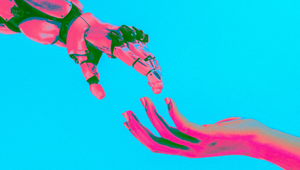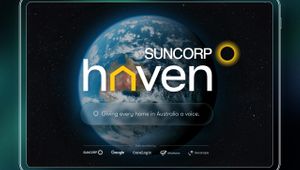
The Directors: A Common Future

A Common Future is Tom Elliott and Simon Reichel, a director duo with a distinctive style and attitude.
Creativity should always come first. This uncompromising belief combined with Tom’s experience as a DoP and Simon’s as an editor results in a unique approach to filmmaking.
A Common Future not only have a strong vision but also a profound understanding of each aspect that flows into the creation of a film.
Being very collective-minded they frequently collaborate with friends and fellow artists while building a distinct body of work that eludes categorization and, much like its creators, refuses to be pinned down.
Name: A Common Future
Location: UK/US
Repped by/in: UNIT9
LBB> What are some upcoming projects that you're excited about? Tell us a bit about them?
ACF> We’ve been working on a few long form documentary projects over the years which are nearing conclusion - so this feels like both a really exciting and a really scary time. Also, we’re about to publish a music video that involves some new, non-live-action approaches which we’re looking forward to sharing.
LBB> What excites you in the advertising industry right now, as a director? Any trends or changes that open new opportunities?
ACF> We feel like the cross-over between science and advertising is really gaining traction and we’re 100% here for it.
Of course, AI is the elephant in the room. We don’t want to sweet-talk a development that’s putting much of our industry at risk and where the border between artistic copyright and plagiarism is yet to be determined. But, in our experience so far and by nature of its algorithm, AI is great at creating “mainstream” content.
Anything with character or a twist however, does require human storytelling.
What excites us in all of this is that we trust our vision to be unique and bold and we hope a lot of advertising will become about real stories and real people told in idiosyncratic ways. This is kind of the basket we’ve been putting all our apples in for a couple years, so might be a little biased here ;)
LBB> What elements of a script sets one apart from the other and what sort of scripts get you excited to shoot them?
ACF> For us it’s all about originality. Something that creates room for creative voices to come together and synergise. Our recent job with Erling Haaland for Nike is a cool example. Although this is a big client with big talent, everyone involved - from Nike to Ultrabrandstudio to us - came together to find a fresh approach to something fairly formulaic: a football shoe commercial.
LBB> How do you approach creating a treatment for a spot?
ACF> If it’s up to us, we prefer a collaborative approach from the jump. A proper creative brainstorm with the agency (and maybe the client too), an exchange of ideas and perspectives - often the final idea is born in these conversations. Then the rest comes after.
LBB> If the script is for a brand that you're not familiar with / don’t have a big affinity with or a market you're new to, how important is it for you to do research and understand that strategic and contextual side of the ad? If it’s important to you, how do you do it?
ACF> We do our research, but nothing replaces a proper briefing from those who are steering the ship. If we don’t know the brand and agency creators’ motivations and strategies - how could we make qualified contributions to the best execution of an idea?
LBB> For you, what is the most important working relationship for a director to have with another person in making an ad? And why?
ACF> To our mind, there is no single one, it’s about a multitude of people collaborating to something greater. Hence why we prefer to see ourselves as a collective.
Conceptually, the relationship to agency creatives is the most important of course. But pragmatically, the relationship to your producer will make or break a shoot. And in execution, it’s probably the director of photography, and later the editor, colourist and sound designer.
LBB> What type of work are you most passionate about - is there a particular genre or subject matter or style you are most drawn to?
ACF> Real stories and science. We’re interested in a lot of styles and genres, but the thing that pulls the cart up the hill is always the story. If that isn’t authentic and doesn’t ignite the vision, the rest is fluff. Scientific research is something we are both strongly involved in privately and in one of our personal doco projects.
Finding ways to introduce the scientific approach to a larger audience and connect it to top tier brands is something we are really excited about.
LBB> What misconception about you or your work do you most often encounter and why is it wrong?
ACF> A problem with how our industry is set up is that we rarely ever encounter these misconceptions, although no doubt they exist, because any feedback that could be perceived as negative or criticism is evaded. You rarely find out why you don’t make it into a pitch, or why your treatment doesn’t clinch the job. If there’s one thing we could change about the process, it would be this.
So maybe the biggest misconception is that we can’t handle criticism ;)
LBB> How do you strike the balance between being open/collaborative with the agency and brand client while also protecting the idea?
ACF> In our work, it is initially the agency’s and brand’s idea - so we don’t see a reason to protect anything. When it comes to protecting our vision, we don’t think there’s an alternative to openness and conversation. Being able to disagree without creating division is the highest art, but when it works, the process feels amazing.
LBB> What are your thoughts on opening up the production world to a more diverse pool of talent? Are you open to mentoring and apprenticeships on set?
ACF> We feel like we mostly need mentoring ourselves but we’re also totally open to passing on our experience. A thing we’ve often dreamed about is a more collectivised approach to the entire process, kind of going away from strict hierarchies and the idea that one role needs one person.
The two of us are kind of blurring the lines between director, DoP and editor in any case, but we often run into confusion with this approach. We’d love to see a world where people can apply their talents to several departments without in-fighting and territorialities (one of the best shot ideas ever on a job of ours came from the art department).
LBB> Your work is now presented in so many different formats - to what extent do you keep each in mind while you're working (and, equally, to what degree is it possible to do so)?
ACF> It’s a bit of a dance on a knife’s edge, but higher resolution cameras kind of cushion the fall here. We often frame our master format in a crop so that the actual recorded image has buffer space to all sides.
LBB> What’s your relationship with new technology and, if at all, how do you incorporate future-facing tech into your work?
ACF> We’re open to working with new media and have dabbled in almost all of them - VR, AI, interactive. We do have some concerns that the hype will eclipse the creative in the near future - meaning that some stories, a lot of stories actually, will probably always be most powerfully told in live-action film.
Then there’s ideas that absolutely DEMAND an innovative and technological approach and this is where the final product is truly engaging and where the process of making it feels fulfilling. But slapping AI or VR onto something that doesn’t need it - we’re here to deliver that uncomfortable message as well.
We understand ourselves as creative partners in a process, and as such we feel obliged to speak our truth even if it hurts. Otherwise, what would you really need us for?
LBB> Which pieces of your work do you feel show what you do best – and why?
ACF> Nike - Haaland Force9 - We began our career with outdoor and extreme sports film, so shooting ultra slo-mo in the ocean felt like coming full circle. Working with top tier talent and finding unseen ways to tell their story is one of our proudest talents.
Hyundai - Experiment N - We deliberately took our time to get into car commercials, waiting for an opportunity to show what we could bring to the table. This idea, embedding the car in a proper ambitious scientific project, was exactly what we had been waiting for.
Google - Search Sounds - Another project where several technologies and creative avenues came together. Shooting portrait-format 16mm was a special treat.















